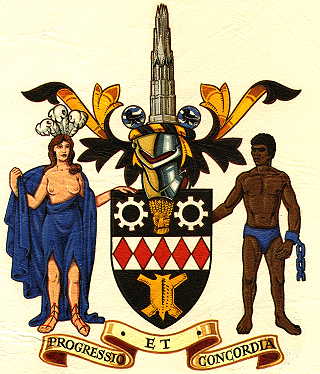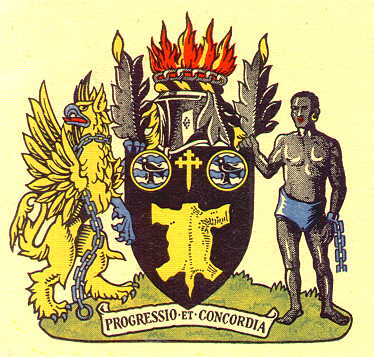Kettering: Difference between revisions
Knorrepoes (talk | contribs) No edit summary |
Knorrepoes (talk | contribs) m (Text replacement - "Literature : " to "'''Literature''': ") |
||
| Line 48: | Line 48: | ||
{{media}} | {{media}} | ||
[[Literature]] : Image and information from [http://www.civicheraldry.co.uk here] | [[Civic Heraldry Literature - United Kingdom|'''Literature''']]: | ||
Image and information from [http://www.civicheraldry.co.uk here] | |||
[[Category:United Kingdom Municipalities K]] | [[Category:United Kingdom Municipalities K]] | ||
[[Category:England]] | [[Category:England]] | ||
[[Category:Granted 1938]] | [[Category:Granted 1938]] | ||
Revision as of 13:52, 7 January 2024
| Heraldry of the World |
| British heraldry portal Civic heraldry of the United Kingdom |
|
KETTERING
Additions : 1974 Burton Latimer UDC, Desborough UDC, Kettering RDC (partly), Rothwell UDC
Incorporated into : 2021 North Northamptonshire
District council
Official blazon
Arms : Sable on a Fess Argent between in chief a Garb Or between two Annulets embattled on the outer edge Argent and in base a Pelt Or five Lozenges conjoined Gules.
Crest : On a Wreath Or and Sable a representation of the Geddington Queen Eleanor Memorial Cross proper between two Fountains each charged with a Martlet Sable.
Supporters : On the dexter side a female Figure richly attired in antique Habit Azure and upon her head a Plume of three Ostrich Feathers Argent and on the sinister side a Negro proper habited about the waist with a Cloth and his sinister wrist encircled with a Handcuff pendent therefrom a broken Chain Azure.
Motto: 'PROGRESSIO ET CONCORDIA' - Progress and concord
Origin/meaning
The arms were officially granted on ?
The black shield is derived from the old arms of Kettering granted in 1938, see image below. Across the centre of the shield are five red lozenges on a silver fesse, with represents the five old councils united in one. The red and white colouring is taken from the arms of Northamptonshire County Council. The other charges on the shield are for the area's industries - a garb for agriculture, a cogwheel for engineering and a hide for leather working.
The crest wreath and mantling are in the Northamptonshire colours of red and white. The crest itself is a representation of the cross at Geddington. On either side of the cross is a fountain to suggest the foundation of the Baptist Missionary Society at Kettering in 1792. They are charged with martlets from the arms of the Watson family of Rockingham.
The dexter supporter is taken from the arms of the Dukes of Buccleuch and Queensbury. The sinister supporter is a freed slave for William Knibb, abolitionist.
Borough council
Official blazon
Arms : Sable a Pelt Or in chief a Cross Crosslet fitchy of the last between two Fountains each charged with a Martlet of the first.
Crest : On a Wreath of the Colours issuant from a Circlet of Chain Flames proper.
Supporters : On the dexter side a Griffin reguardant Or beaked and membered and gorged with a Chain reflexed over the back Azure and on the sinister side a Negro proper habited about the waist with a Cloth and his sinister wrist encircled with a Handcuff pendent therefrom a broken Chain Azure.
Motto: 'PROGRESSIO ET CONCORDIA' - Progress and concord
Origin/meaning
The arms were officially granted on September 26, 1938.
The pelt represents Kettering's chief industry, the manufacture of boots and shoes. The heraldic fountains refer to the formation of the Baptist Missionary Society at the Mission House at Lower Street in 1792. The martlets are from the arms of the Watson family of Rockingham, who with the Montagus are Lords of the Manor of Kettering.The cross is from the arms of the See of Peterborough.
The crest symbolizes the iron-ore industry.
The Montagu family is further represented by the griffin and the negro with a broken chain recalls the pioneer work of William Knibb in the cause of freeing the slaves. Knibb was born at Kettering in 1803.
These arms are currently used by the Kettering Town Council.
Contact and Support
Partners:
Your logo here ?
Contact us
© since 1995, Heraldry of the World, Ralf Hartemink 
Index of the site
Literature: Image and information from here













